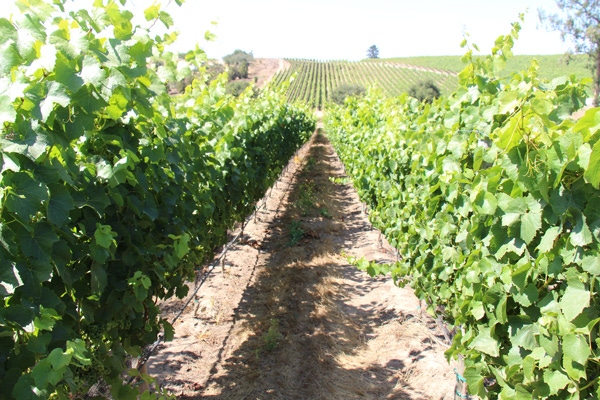
Grape vines require potassium fertilization much less frequently than applications of nitrogen. This reflects the more steady supply of potassium provided by soil minerals, the depth of soil in many vineyards and the resistance of potassium to losses from leaching.
While the vine and crop won’t benefit from excess potassium levels, a deficiency can have dramatic effects, report University of California researchers.
As Ashraf El-Kereamy, University of California Cooperative Extension farm advisor for Kern County, writes in the latest issue of the Vit Tips viticulture newsletter, potassium is one of the most important macro elements required for good vine productivity and high fruit quality.
“Potassium activates a large number of enzymes that catalyze several physiological processes,” he says. “Potassium also regulates cell pH to optimize different enzymatic reactions that control vine growth and development, and it helps regulate the osmotic pressure of different parts of the vines.”
For example, El-Kereamy says, potassium enables vines to withstand water stress by controlling the opening and closing of stomata. These pores on the leaves allow carbon dioxide and water vapor to pass through to enable photosynthesis and transpiration. When stressed for water, vines close these stomata to reduce the amount of water lost through transpiration.
“Under potassium deficiency, the stomata close very slowly, reducing the vine’s tolerance to water stress,” he says. “Conversely, accumulation of potassium in the roots creates an osmotic pressure that increases the water flow into the roots and improves vine tolerance to water deficit.”
The vine also needs potassium to maintain the energy required for photosynthesis and for controlling respiration. Inadequate levels of potassium increase respiration, slowing vine growth and develop, while reducing the production and transport of sugar to the berries. As a result, fruit quality and red coloration suffer.
Potassium is involved in maintaining the energy in plants; K deficiency negatively affects the vine energy level, reduces photosynthesis and increases respiration which slows vine growth and development. Sugars are produced in the leaves and transported to the fruit through a transport system that requires energy. Inadequate K supply reduces the available energy and, consequently, reduces the transport of sugars to the berries.
These sugars are essential for producing high fruit quality and proper red coloration, El-Kereamy notes. At the same time, this transport system is critical for water and nutrient uptake and transport through the vine.
“Foliar application of potassium alone or in combination with ethylene releasing compounds is effective for improving grape color with some side effect on reduced berry size,” he says. “Although a high level of potassium fertilizer could help improve vineyard productivity and fruit quality, excessive amounts could negatively affect the uptake of other nutrients such as calcium and magnesium.”
Symptoms of a potassium deficiency appear on the leaves usually in midsummer with fading of green color at leaf edges and between the main veins. In some red varieties, such as Cabernet Franc, these areas may turn red.
Also, the leaf margins tend to curl upward and become necrotic. Leaves in the middle of shoots usually show the first signs of a potassium deficiency
In the case of a mild potassium deficiency, symptoms won’t show up until late summer, approaching harvest. A severe deficiency, on the other hand, may be apparent around bloom and could lead to chlorosis of most of the leaf area as well as leaf margins.
Before applying any potassium fertilizers, El-Kereamy recommends checking the bloom petiole potassium content and analyzing soil nutrient levels.
About the Author(s)
You May Also Like




